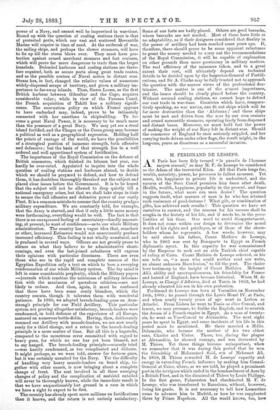COAL AS A FACTOR IN WAR.
JT is not too much to say that the higher strategy of modern Naval warfare must be based on Coal supply, and that the sharp limitations under which fighting-ships now labour will not be fully realised till we have ourselves been at war with a great Naval Power. Steam has introduced changes which operate over a far wider area than that of mere Fleet actions, supposing such actions to be now-a-days practicable in the old sense. To direct Naval operations in distant seas with success and certainty, we have to depend on a secured coal supply for our war-ships, and a Naval Intelli- gence Department able to tell us exactly what our possible enemies can do. Knowing the coal resources of the principal ports of the world and the coal endurance of foreign ships, it should be possible to lay down tolerably certain limits to the operations of an enemy, since, if neutrality laws are observed with any degree of strictness, it is only subject to certain political combinations that certain ships can be present at all in certain places. Thus conditions more or less hard and fast are introduced which will rule the course of a great Naval war. It is true that a large number of iron- dads are fair or good sailers, and reserving their coal-bankers for emergencies, can sail round the world; but Naval com- binations cannot be made with certainty, nor can the operations of an enemy's cruisers be seriously hampered, still less pre- vented, without the continuous use of steam. The nation which can count upon that use, therefore, wields an enormous power. Thus coaling stations have become strategical points of vast importance, bringing to bear on Naval war much the same influence which well-placed and well-found fortresses exert on land. But a land fortress is not the absolute source of the mobility of an army, though it may greatly facilitate the movements of a campaign. Moreover, a fortress may in a sense be extemporised, if time allows, as at Plevna. A coaling station, however, supplies the actual motive-
power of a Navy, and cannot well be improvised in war-time. Bound up with the question of coaling stations there is that of protected ports, which our vast and scattered Mercantile Marine will require in time of need. At the outbreak of war, the sailing ships, and perhaps the slower steamers, will have to lie up till the storm blows over. They must have pro- tection against armed merchant steamers and fast cruisers, which will prove far more dangerous to trade than the larger ironclads. Defended harbours and coaling stations are there- fore required, both as secure ports along great trade routes, and as the possible centres of Naval action in distant seas.
Steam has, in fact, changed the relative values of numerous widely-dispersed scraps of territory, and given a military im- portance to far-away islands. Thus, Sierra Leone, as the first British harbour between Gibraltar and the Cape, acquires considerable value; while in view of the Panama Canal, the French acquisition of Tahiti has a military signifi- cance. The annexation policy on which France appears to have embarked may, indeed, prove to be intimately connected with her exertions in shipbuilding. To be- come a great Naval Power, it is necessary to be much more than the possessor of a great Navy. We may yet see a coral island fortified, and the Chagos or the Cocos group may become
a political as well as a geographical expression. Holding half the points of vantage of the world, we have the possibilities of a strategical position of immense strength, both offensive and defensive ; but the basis of that strength lies in a well ordered and well apportioned system of fortification.
The importance of the Royal Commission on the defence of British commerce, which finished its labours last year, can hardly be over-rated. Appointed to inquire into the whole question of coaling stations and harbours abroad, to decide which we should be prepared to defend, and how to defend them, it has doubtless thoroughly threshed out the subject and placed clear issues before the Government. It is to be hoped that the subject will not be allowed to drop quietly till a national emergency arises, but that we shall take steps in tinde to secure the full offensive and defensive power of our costly Fleet. It is a common mistake to assume that the country grudges military expenditure. We are constantly told, for example, that the Army is starved, and that if only a little more money were forthcoming, everything would be well. The fact is that there is an unexpressed feeling of uncertainty—hardly amount- ing, at present, to want of confidence—as to our whole Military administration. The country has a vague idea that, somehow or other, increased Estimates would not unnecessarily produce
increased efficiency. This feeling is not wholly unnatural, and is produced in several ways. Officers are not greatly prone to
silence on what they believe to be administrative short- comings, and even the last-joined subalterns will express their opinions with particular directness. There are even those who see in the rapid and complete success of the Egyptian Expedition only a text on which to base a sweeping condemnation of our whole Military system. The lay mind is left in some considerable perplexity, which the Military papers —journals which combine the minimum of military informa- tion with the maximum of querulous criticism—are not likely to reduce. And then, again, it must be confessed that there have been some costly blunders, which the country resents, though it tolerates them with wonderful patience. In 1860, we adopted breech-loading guns on Arm- strong's principle for our Field Artillery. This particular system not proving altogether satisfactory, breech-loaders were condemned, in bold defiance of the experience of all Europe, matured on numerous battle-fields. Having, then, deliberately rearmed our Artillery with muzzle-loaders, we are now nearly ready for a third change, and a return to the breech-loading principle is a mere matter of time. But all this is a bagatelle, compared to the monstrous error committed with regard to heavy guns, for which no one has yet been blamed, not to say hanged. The breech-loading principle—scarcely tried —was hastily condemned, as too complicated and delicate. It might perhaps, so we were told, answer for fortress guns, but it was certainly unsuited for the Navy. Yet the difficulty of handling very heavy muzzle-loaders on board ship, to-
gether with other causes, is now bringing about a complete change of front. The cost involved in all these sweeping changes of policy and the complication of materiel entailed will never be thoroughly known, while the immediate result is that we have unquestionably lost ground in a race in which we have a right to expect to be first.
The country has already spent more millions on fortifications than it knows, and the return is not entirely satisfactory. Some of our forts are badly placed. Others are good barracks, where barracks are not needed. Most of them have little or no adaptability, as if their designers considered that finality in the power of artillery had been reached some years ago. If, therefore, there should prove to be some apparent reluctance to grant the money needed to carry out the recommendations of the Royal Commission, it will be capable of explanation on other grounds than mere parsimony in military matters. The real efficiency of the measures taken, and to a great extent their cost, will ultimately' depend on technical details to be decided upon by the Inspector-General of Fortifi- cations, and Sir A. Clarke may be fully trusted not to approach the question with the narrow views of the professional doc- trinaire. The matter is one of the ulmost importance, and the issues should be clearly placed before the country. Without secured coaling stations, we cannot hope to defend our vast trade in war-time. Countries which have, compara- tively speaking, no war navies, can fit out ships which will be far more destructive than the Alabama ;' and these ships must be met and driven from the seas by our own cruisers and armed mercantile steamers, operating freely from dispersed and distant bases. Moreover, we must hold fast the power of making the weight of our Navy felt in distant seas. Should the commerce of England be once seriously crippled, and her carrying trade driven under other flags, the result might, in the long-run, prove as disastrous as a successful invasion.



































 Previous page
Previous page